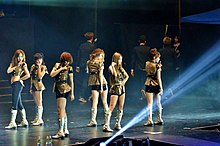Chinese idol

The Chinese pop music industry has a growing trend of idols and idol groups, who are entertainers manufactured and marketed for their image and attractiveness. Idols are primarily singers (either as members of a group or as solo acts), but they are also trained in other roles, such as acting, dancing, and modeling. Unlike other celebrities, idols are promoted through merchandise and endorsements by talent agencies while maintaining a carefully curated public image and social media presence, as well as a strong parasocial connection with a passionate fan base through concerts and meetups.
History
[edit]The Chinese entertainment industry adopted the concept of "idols" from Japan and South Korea, where thousands of teenagers undergo years of training, and only a select few eventually debut in idol groups that generate income for their agencies through the release of musical records, sale of merchandise, brand endorsement deals, and concert revenue.[1]
The early 2010s saw the rise in popularity of Japanese-style idol groups such as SNH48[2] and TFBoys. On January 27, 2017, some members of SNH48 performed on the CCTV New Year's Gala as backup dancers during a segment with Coco Lee and JJ Lin.[citation needed] This was the first appearance by an idol group at a major Chinese event. Korean idol groups such as Exo-M, SJ-M and T-ara also reached a larger audience through performances in China.[citation needed]
The success of Chinese reality shows Idol Producer and Produce 101 China, produced by iQiyi and Tencent Video, has led commentators to label 2018 as the start of the Age of Idols. These shows feature about a hundred contestants undergoing training, performances, and eliminations through audience votes, culminating in a few debuting as idol band members. Together, the shows were viewed 8.07 billion times, creating buzzwords like "C-position" for the central role in a performance.[3][4][1] Idol groups Nine Percent and Rocket Girls 101 debuted through these shows.[5] Other idol competition shows Youth With You and Produce Camp 2019 followed in 2019.[6]
Examples of other K-pop style idol groups include R1SE, INTO1, and many more. [citation needed]

Government regulations
[edit]On September 2, 2021 China's National Radio and Television Administration cracked down on idol reality TV, going as far as to ban idol competition shows[7][8][9][10] after multiple fandom controversies surrounding the massively popular idol talent show Youth With You 3, which was taken off air in May 2021.[11][12][13]
As part of the Chinese government's wider crackdown on the technology and entertainment sectors, the National Radio and Television Administration included in an eight-point plan that "sissy idols," effeminate men, "overly entertaining" things are to be prohibited.[14] The entertainment sector is to promote traditional and socialist culture, and establish "correct beauty standards".[15] The Communist Party's propaganda department accused the entertainment industry of negatively influencing youth and polluting society. The Cyberspace Administration of China also called for an end to toxic celebrity fandom culture,[14] with a 10-point plan which addresses stopping the spread of "harmful" information, gossip, and scandal within fan groups. The government has also prohibited the publication of celebrity ranking lists and the practice of charging fans to vote in celebrity reality competition shows.[15]
See also
[edit]References
[edit]- ^ a b Ding, Gang; Zhang, Boyuan; Teng, Jing Xuan (2018-08-17). "China's Teen-Idol Obsession". Caixin. Retrieved 2024-06-07.
- ^ Yin, Yijun (2019-06-21). "Born Again: China's Girl Groups and the Life Cycle of a Stardom". Sixth Tone. Retrieved 2024-06-07.
- ^ Achim, Adina-Laura (18 November 2019). "The Rise of Idol Economies in China". Jing Daily.
- ^ "China's Pop Idols are Too Soft for the Party". 12 November 2018.
- ^ "偶练九人团出道!蔡徐坤范丞丞无悬念 林彦俊爆冷". 6 April 2018.
- ^ 簡, 子喬 (8 June 2019). "冠軍足足贏了第二名2300萬票! 《創造營2019》最終11人名單出爐". Yahoo奇摩名人娛樂. Yahoo. Retrieved 12 February 2020.
- ^ "China bans talent shows in showbiz crackdown – DW – 09/02/2021". dw.com. Deutsche Welle (DW).
- ^ "China bans reality talent shows". The Hindu. THG PUBLISHING PVT LTD. 2 September 2021.
- ^ Ni, Vincent; correspondent, Vincent Ni China affairs (2 September 2021). "China bans reality talent shows to curb behaviours of 'idol' fandoms". The Guardian. Guardian News & Media Limited.
{{cite web}}:|last2=has generic name (help) - ^ "China Bans Reality Talent Shows In Major Showbiz Crackdown". NDTV.com. NDTV CONVERGENCE LIMITED.
- ^ Yau, Elaine (5 May 2021). "Chinese boy band show goes off air after allegations against competitor". South China Morning Post. South China Morning Post Publishers Ltd.
- ^ Looi, Sylvia (10 May 2021). "After controversies, no winners for China's 'Youth With You 3' as producers cancel finals". Yahoo News. Yahoo.
- ^ Yuan, Ye (2021-08-27). "Streaming Service iQiyi Cancels Idol Competitions, Online Voting". Sixth Tone. Retrieved 2024-06-07.
- ^ a b Frater, Patrick (2021-09-03). "China Wants 'Sissy Idols' and 'Effeminate Men' Scrubbed From Entertainment Industry". Variety. Retrieved 2024-06-07.
- ^ a b Zhang, Phoebe (2021-09-02). "China releases plan to ban 'sissy idols', promote a 'correct beauty standard'". South China Morning Post. Retrieved 2024-06-07.
